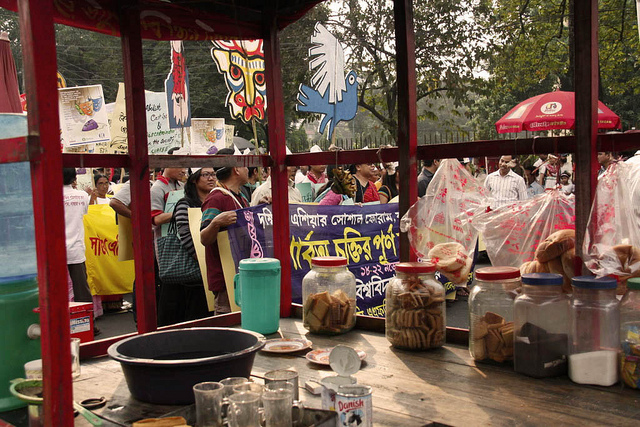“Political violence affects the Bangladesh economy”
August 19 A surge in political violence has economic impact on Bangladesh, writes Osmi Anannya, 26, a Commonwealth Correspondent from Dhaka, Bangladesh. The trend may be linked to upcoming elections, but there are concerns about an adverse effect on both investors and domestic markets.
A surge in political violence has economic impact on Bangladesh, writes Osmi Anannya, 26, a Commonwealth Correspondent from Dhaka, Bangladesh. The trend may be linked to upcoming elections, but there are concerns about an adverse effect on both investors and domestic markets.
Episodes of political violence in Bangladesh have been ongoing since February 2013, with the frequency of strikes continually increasing.
In one strike held last month, protestors attacked buses and blockaded roads, while shops were closed throughout the capital, resulting in business revenues sliding. In Bangladesh, strikes have long been known to be bringing the country to a standstill and the recent wave of strikes can partly be attributed to the upcoming elections, which are scheduled for early 2014.
According to the nation’s Commerce Ministry, Bangladesh has suffered 36 nationwide shutdowns this year, in comparison to the 17 from 2009 – 2011. Figures from the Federation of Bangladesh Chambers of Commerce and Industry showcase that the strikes have already accumulated an approximate cost of more than $7bn.
The strikes hold big concerns for foreign investors unsure of what to make of the recent escalation of violence in the country. Bangladesh is known to be in the process of still developing its infrastructure, so despite the fact that a great amount of cheap labour is easily available in the country, foreign investors still look upon the scenario with respect to investment with a great deal of uncertainty. Unpredictable politics and ongoing episodes of violence in the country is only adding to this confusion.
A report published by the International Monetary Fund (IMF) states that policies which are going forward in the government are set to build on already achieved macroeconomic stabilizations. Because national elections are scheduled for early 2014, much of the economic policy agenda for the present government is really about bringing in fiscal and monetary policies that spur on economic growth.
New structural measures have been introduced, with the aim of strengthening fiscal revenues, public debt management, and the financial sector. In addition, public investments has seen growth, macroeconomic pressures continue to ease, reserves are increasing and even underlying inflation has seen a decline, supported by strict fiscal and monetary policies.
Furthermore, export growth has picked up as well and remittances continue to be supportive in the country – about half of Bangladesh’s export-market is the European Union (EU); the export of garments have significantly increased their EU market share in the past five years.
Despite the positive economic developments, domestic strife in Bangladesh is really taking its toll on economic growth. Although export performance and public investments has seen growth, they have for the most part been offset by slow private investment and consumption, for example, in the form of weak import growth.
This weak import growth is giving way to measured domestic demand, while political tensions and nationwide strikes continue to put up barriers to economic growth. Food inflation in the country, for example, continues to remain high, possibly due to the supply disruptions caused by the many strikes in Bangladesh in the past few months.
The near-term financial outlook has weakened, and an intensification of violence in the country could most likely affect both investment and growth. Growth prospects here could really be cut back, owing to a loss of confidence and a fall in both investment and consumption. The government therefore needs to prioritise fiscal reforms, in order to generate higher tax revenues, oversee an increase in public expenditure, and reinforce debt sustainability, which would result in producing long-term economic stability for Bangladesh.
According to the same IMF report, tax collections by the National Board of Revenue fell short by about 0.3 per cent of the GDP in the first half of 2013. This reflects the impact that slow import growth and import-related taxes has had on the economy. Tax collections are projected to continue to suffer, in the most likelihood from slower import growth and strikes, at least through the first half of 2014.
photo credit: Joe Athialy via photopin cc
………………………………………………………………………………………………………………
About me:
I’m from Dhaka, Bangladesh. I’m a Computing student at UCSI University and a Correspondent for The New Federalist and Shifting Grounds, a PS Helper at The Student Room, a Politics and Current Affairs Blogger at BlogActiv and UACES, and a STEMNet and IMechE Ambassador.
…………………………………………………………………………………………………………………
Opinions expressed in this article are those of the author and do not necessarily represent the views of the Commonwealth Youth Programme. Articles are published in a spirit of dialogue, respect and understanding. If you disagree, why not submit a response?
To learn more about becoming a Commonwealth Correspondent please visit: http://www.yourcommonwealth.org/submit-articles/commonwealthcorrespondents/
………………………………………………………………………………………………………………




